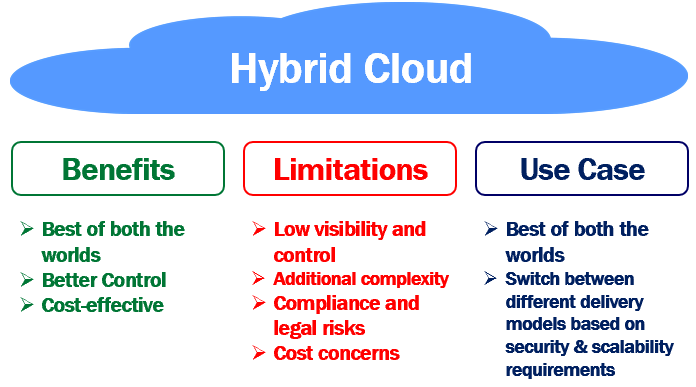What is a hybrid cloud. Benefits, limitations and use cases
As the name implies, a hybrid cloud is hybrid i.e, it's a combination of both the private cloud and the public cloud. It is not a different cloud altogether. It's just that, both, the private and public clouds work together to meet our organization requirements. I mean, it offers the best of both the worlds.
For example, we can use the private cloud for security sensitive, business-critical operations like financial reporting, and, the public cloud for high-volume, lower-security needs such as web-based email.

In a hybrid cloud, we have a concept called cloud bursting. This sounds like a fancy technical term, but all it means is the following. You have an application or a service. To start with, it's hosted and running in your private cloud. The application continues to run in your private cloud until there is a spike in the demand. When there is a spike in demand, "burst through" to the public cloud to tap into the additional computing resources provided by the public cloud. When the spike in demand subsides, you scale down just to your private cloud and no longer use the public cloud resources.
If you are wondering, why will there be a sudden spike in demand. Well, there are number of reasons. May be you are launching a new business or product line. Seasonal events like online christmas shopping or tax filing for example, may aslo increase the traffic to your application or service.
With private cloud you only have so much physical infrastructure. How much you can scale up, depends on that physical infrastructure. Beyond certain point, if you want to scale up, you have to buy additional hardware, which is not only expensive but also time consuming to procure and setup. When the spike in demand subsides, we are no longer using this additional infrastructure.
Benefits of hybrid cloud
- Best of both the worlds - The obvious benefit is, a hybrid cloud provides, best of both the worlds ie. private and public clouds.
- Better Control - With the hybrid cloud, you have better control on what runs where. For example, you can use the private cloud for security sensitive apps and the public cloud for thos apps that have high-volumes of traffic, but not that security sensitive.
- Cost-effective – With the hybrid cloud, you only use public cloud resources when you need them i.e when there is a spike in demand, you burst through to the public cloud to use that additional computing power provided by the public cloud. When the demand subsides you scale down just to your private cloud.
Limitations of hybrid cloud
- Low visibility and control - Just like a public cloud, even in a hybrid cloud, you don't have much visibility and control over infrastructure that is owned by the public cloud service provider.
- Additional complexity - Integrating private cloud with public cloud introduces additional infrastructure complexity. Also, it invloves, considerable effort, time and complexity to maintain and evolve these 2 different types of clouds as the organization needs change.
- Compliance and legal risks - Since you don't have much visibility and control over public cloud infrastructure, you are relying on the cloud service provider to protect data and adhere to local and international regulations. Your company may still be liable, if the cloud service provider, fails to live up to the task and if there is a data breach.
- Cost concerns - If you use the public cloud resources for a along time, the overall price tag may be higher than what you anticipated.
When to use hybrid cloud
Hybrid cloud provides, best of both the worlds - i.e private and public clouds. For example, you are an IT company and provide services to 2 different sets of clients. For, one set of clients, security is not a massive concern. They just want to scale up and down at will. For these clients you can use the public cloud resources. For the other set of clients, security is the most important thing and they want to have complete and rigorous control over the cloud infrastructure. For these clients, you can use the private cloud resources. So the point that I am trying to make is, a hybrid cloud allows you to switch between different delivery models depending on your clients security and scalability requirements.
© 2020 Pragimtech. All Rights Reserved.

